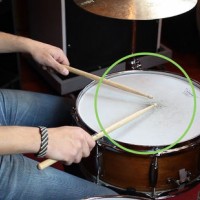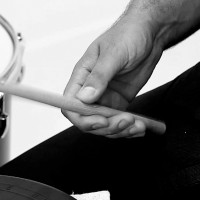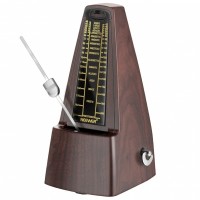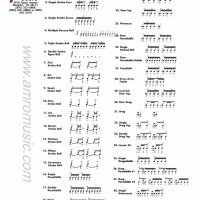Top Ten Tips for Playing Drums
I have been playing drums/percussion for almost five years. As a high school student, I have performed with a marching band, a pep band, two jazz bands, a percussion ensemble, a Korean percussion ensemble, and an orchestra group.Despite my many experiences, I still have a long way to go before I can consider myself an "expert". Even though I am no longer a beginner, there are some things I wish I had known when learning to play. I made so many mistakes that I had to go back and re-practice. These tips helped me to develop some of my skills, and were acquired through playing with other people.
Feel free to add tips of your own!
The Top Ten
1 Learn the basics first.
 Learning the basics allows you to create the foundation for how you play. Examples of the basics include how to hold the drum sticks, proper drum strokes, and good form when playing.
Learning the basics allows you to create the foundation for how you play. Examples of the basics include how to hold the drum sticks, proper drum strokes, and good form when playing.
 Learning the basics allows you to create the foundation for how you play. Examples of the basics include how to hold the drum sticks, proper drum strokes, and good form when playing.
Learning the basics allows you to create the foundation for how you play. Examples of the basics include how to hold the drum sticks, proper drum strokes, and good form when playing.
2 Develop your technique.
 Your technique is so important. Developing basic technique is necessary to start with, but going beyond it requires careful development. Good technique allows you to play better, more seamlessly and reduce your risk of injury.
Your technique is so important. Developing basic technique is necessary to start with, but going beyond it requires careful development. Good technique allows you to play better, more seamlessly and reduce your risk of injury.
 Your technique is so important. Developing basic technique is necessary to start with, but going beyond it requires careful development. Good technique allows you to play better, more seamlessly and reduce your risk of injury.
Your technique is so important. Developing basic technique is necessary to start with, but going beyond it requires careful development. Good technique allows you to play better, more seamlessly and reduce your risk of injury.
3 Use a metronome when practicing.
 It's a part of the drummer's job to keep time. Even if your tempo is terrible, it can be developed, as it is a skill. A metronome guarantees a specific tempo, and playing along with it helps you to match it.
It's a part of the drummer's job to keep time. Even if your tempo is terrible, it can be developed, as it is a skill. A metronome guarantees a specific tempo, and playing along with it helps you to match it.
 It's a part of the drummer's job to keep time. Even if your tempo is terrible, it can be developed, as it is a skill. A metronome guarantees a specific tempo, and playing along with it helps you to match it.
It's a part of the drummer's job to keep time. Even if your tempo is terrible, it can be developed, as it is a skill. A metronome guarantees a specific tempo, and playing along with it helps you to match it.
4 Learn the rudiments.
 The rudiments help you to develop technique, phrasing, control, coordination, and sticking patterns. This is a huge benefit when trying to play more complex music.
The rudiments help you to develop technique, phrasing, control, coordination, and sticking patterns. This is a huge benefit when trying to play more complex music.
 The rudiments help you to develop technique, phrasing, control, coordination, and sticking patterns. This is a huge benefit when trying to play more complex music.
The rudiments help you to develop technique, phrasing, control, coordination, and sticking patterns. This is a huge benefit when trying to play more complex music.
5 Start very slow and work up to the intended tempo.
When you learn a new piece, you cannot expect to play it perfectly at tempo. You need time to develop muscle and music memory to ensure you can play it correctly. Playing music too fast can cause you to be underdeveloped and sloppy.
6 Try to learn one thing at a time.
If you try to learn multiple techniques, patterns, etc. at once, you will quickly become overwhelmed. Take one thing you want to learn, work on it until you get it, then you can learn something else. The key is to take it slow.
7 Learn grooves in the simplest way possible.
Learning grooves at their most basic is beneficial because it gives you an idea of the style. When you become developed enough, you can start to add your own touches to them and even develop your own.
8 Break up the measures.
Learning one measure at a time is helpful for working on transitions and how you play it. Getting comfortable with a specific part allows you to be more prepared when playing the full phrase.
9 Learn a variety of styles.
Learning a variety of styles gives you a more diverse experience in music, and it opens up the door to fusion patterns and new techniques.
10 Watch other drummers.
 Watching other drummers gives you visual information on what other drummers would do, and can help you to learn what you want to work on. Different drummers will do different things, so make sure you have a variety.
Watching other drummers gives you visual information on what other drummers would do, and can help you to learn what you want to work on. Different drummers will do different things, so make sure you have a variety.
 Watching other drummers gives you visual information on what other drummers would do, and can help you to learn what you want to work on. Different drummers will do different things, so make sure you have a variety.
Watching other drummers gives you visual information on what other drummers would do, and can help you to learn what you want to work on. Different drummers will do different things, so make sure you have a variety.The Contenders
11 Play with other musicians.
12 Set realistic goals.
13 Focus more on how you play than on how others play.
14 Trust and enjoy the process of improving.
15 Practice in intervals.
16 Learn drum notation.
17 Treat higher skill as something to work up to rather than something to compete against.
I've made this mistake literally more often than any of the others. If you continuously compare yourself to better drummers, you'll find yourself getting discouraged. It is vital to both your playing and your self-esteem that you try to see higher skill as a goal rather than as personal inadequacy.
18 Don’t wait too long to start learning songs.
BAdd New Item